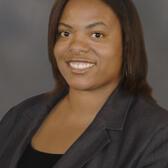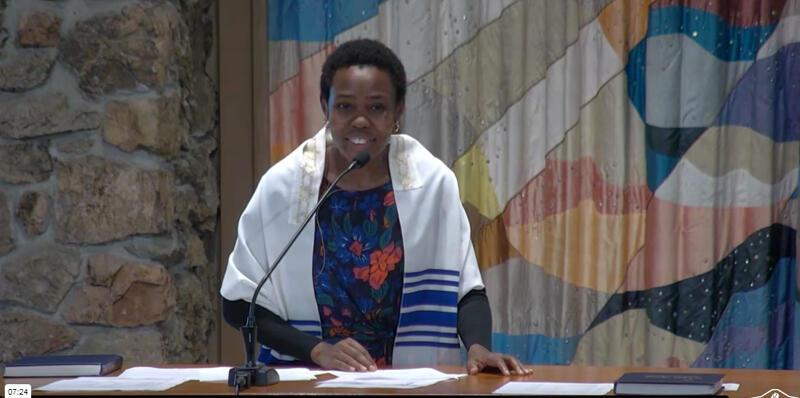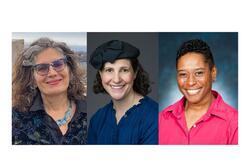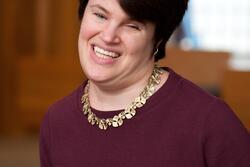Trailblazing Rabbi Shoshana Nambi
Among the green, rolling foothills of Eastern Uganda lies a Jewish community that is the hometown of a trailblazing new rabbi, Shoshana Nambi. Nambi is the first Ugandan woman to be officially ordained as a rabbi and the first-ever Ugandan ordained by the Union of Reform Judaism.
Nambi's achievement is remarkable, considering the conservative and patriarchal society in which she was raised. In rural Uganda, many families place a lesser priority on their daughters' education, preferring girls to spend their time raising corn, cassava, and kids. As of 2016, thirty-four percent of women ages 20 to 24 were first married before the age of 18. The few women who work outside the home keep simple shops, each with a nearly identical inventory, that compete for few customers.
Nambi’s road to the rabbinate has been as steep and winding as the bumpy dirt road leading to the beautiful yet humble country home she shares with her extended family. Full, thick evergreen trees of all heights obscure the oncoming switchbacks in the uphill path. There are several forks in the road and no signs. Intimidation and providence are the only travel companions.
Nambi, 36, is thankful for the circumstances that came together to create the life she has today. She's a graduate of Semei Kakungulu High School, the only Jewish secondary school in the region. None of her classmates could have foreseen what her life would eventually become.
I met Nambi almost two years ago, first through WhatsApp text messages and then on several occasions when she visited Uganda. At our first meeting, I admired the pronounced apples of her cheeks that rose up to meet her almond-shaped eyes with each smile. “The Reform rabbinical school gave me a full scholarship,” she told me proudly.
The rabbinical school's generosity and faith in Nambi was well placed. Always a dedicated student, she’s from a disadvantaged region with an undervalued currency. The median household income in Eastern Uganda is a mere $325 per month. A single round-trip airline ticket to the US is equivalent to an entire month’s income for the wealthiest family in the community. Her journey to the finish line of rabbinical school would not have happened without this scholarship.
The Jewish community of Uganda, also known as the Abayudaya, is underserved and underrepresented in the rabbinate. Nambi is one of only four native Ugandans to be ordained out of a Jewish population hovering near 6,000.
Life in America during her years of rabbinical school in New York City was an adjustment for Nambi and for her young daughter, whom she is raising alone. “My daughter loves life in America!” she exclaimed over homemade pilau rice. She listed all the modern conveniences of big city life: delivery apps, streaming services and the seemingly endless number of kosher restaurants.
After being ordained, Nambi’s ambition called for her to stay in the US, shuttling across time zones in search of a good opportunity. She’s now the Assistant Rabbi at Congregation Beth Am, a Reform synagogue in Los Altos Hills, CA. The role requires Nambi to wear many hat: prayer leader, educator, community organizer, and counselor. She’s excited about it all.
Nambi is starting out her career with a refreshing optimism and a global perspective on Jewish life. Sifting through her experiences with many Jewish cultures, Nambi is determined to bring her California community an engaging Judaism that reflects her culture and is also relevant to them. This means bringing in the kadodi drums while leaving behind the traditional practice of separate seating for men and women, for example.
Nambi’s life experience as a Ugandan woman allows her to see many issues through a gender lens. “Things can be different when women are given chances.” she said, her lilting East African accent hugging every word, at a lunch she hosted at her family's home in Uganda earlier this year. She encouraged the circle of Jewish moms assembled there to continue investing in their daughters' education, as Uganda has no free public education system.
Questions linger about the reception Nambi will receive if she ever decides to return to Uganda and lead the Jewish community there. There is only one tiny Reform congregation in Uganda. The progressive norms of the movement in which Nambi was ordained are somewhat at odds with traditional Abayudaya Jewish culture. For example, the Conservative and Orthodox synagogues in Uganda have separate-gender seating.
Being the first woman from Uganda to become a rabbi means that Nambi has many people watching her career and even more cheering her on from afar. Senior rabbis have chimed in with advice that’s not in any textbook. “Don’t change anything about the synagogue during your first year and call every congregant during your first month!” Rabbi Emily Mathis advised her. Whether or not she heeds the advice, Rabbi Shoshana Nambi is bringing her best to her congregation, the Jewish community of Uganda, and the future of women rabbis.








Rabbi Nambi's story is awe inspiring. Thank you for sharing it.